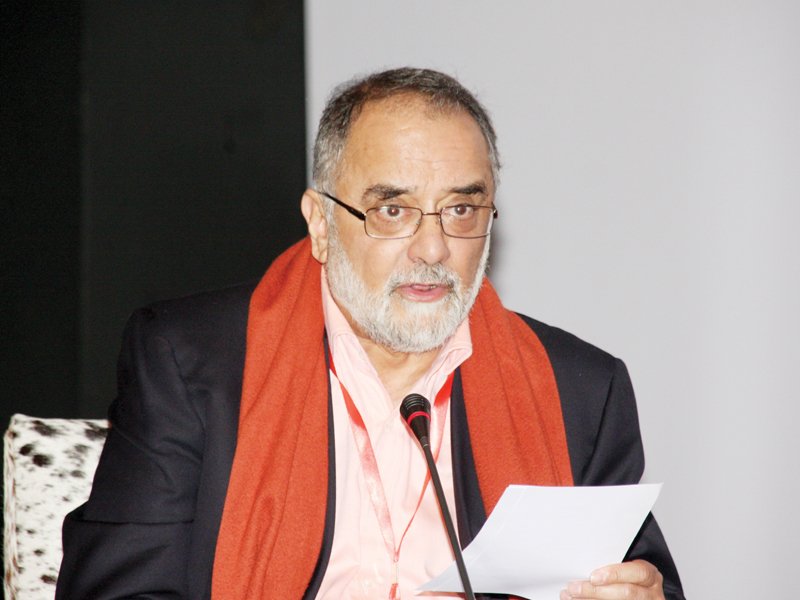
“China will be the economic salvation of Afghanistan. The Chinese have bought mineral rights in Afghanistan and plan to build a railway there. India has also invested hugely in Afghanistan. Pakistan can also benefit, but it cannot do this alone. It can partner with India and China to invest in Afghanistan,” according to author Ahmed Rashid.
Rashid was in conversation with historian William Dalrymple in Cultures in Conflict, the last session of the Lahore Literary Festival on Sunday.
Where is Pakistan headed was a question put to both men. Dalrymple said there was a need for a peace deal with India so that funds could be diverted from the military to development. “Both sides are winners this way,” he said.
Rashid added that extremism must be addressed. He said the main cause of ill feeling towards Pakistan in India, the last time he visited, was the Mumbai attacks. “There is frustration that we are harbouring the culprits and not putting them on trial. The genie Ziaul Haq released must be put back into the bottle,” he said.
The conversation started off with Dalrymple laying out his most recent book, Return of a King: The Battle for Afghanistan, which details the first Anglo-Afghan War in the 19th Century and the competition between imperial Russia and the East India Company.
The East India Company was “like Microsoft with a large army,” said Dalrymple. It had a board, shareholders, published accounts as well as the largest army in Asia. It had conquered more of India than Napoleon had of Europe, he said.

Dalrymple said that the British believed the Russians wanted to take over Afghanistan and so they needed to get there first, and that if they did do, all of Asia would be theirs. The British had an important asset in Shah Shuja, the grandson of Ahmed Shah Durrani, who could replace Dost Mohammad as ruler of Afghanistan.
William Macnaghten, an adviser to then governor-general of India Lord Auckland, travelled to Lahore and negotiated with Ranjeet Singh, the head of the Sikh empire in the Punjab, for safe passage for a British force to invade Afghanistan. He read out the rhetoric of the day: “Those who are not with us, are against us.”
Rashid said the book read like a “predictable thriller”, in that one knew how it would end.
Dalrymple said that the British did invade and very easily took over, but did not fortify their position. Shuja was installed as ruler, but it was clear that he was a puppet. Kabul took on the reputation of a brothel for the British, which incensed the local population.
So the Afghans rose up and threw most of the British out, capturing some of them. A year later, the British sent another invasion. This second army destroyed villages as it went along and ended with Char Chatta Bazaar being bombed and the British riding away.
Dalrymple said that while researching his book, an Afghan said to him that Afghanistan’s fate was always determined by its neighbours. The man added, “The Americans here know the game is over. These are the last days of America. Now it is China’s turn.”
A lot of his research material came from the State of Punjab’s archives, he said.
Rashid suggested Dalrymple’s account had parallels with the current situation in Afghanistan, such as “the debate in the British camp about when to get out, younger officers wanting to take over, huge debates about leaving troops behind and negotiating with the other side”.
He added that the Taliban were also tired now and might be ready for a partial agreement. “The Taliban who have stopped fighting are playing a large role in trying to convince the West to speak with the Taliban and form an agreement,” he said.
Dalrymple asked Rashid if there was Indian presence in Kabul. Rashid responded that there was no evidence of a huge presence, but there was a tit-for-tat proxy war happening in Kabul, much like in Kashmir. An audience member asked Dalrymple if Britain ever learnt from history. “We have forgotten what the Raj was like. It is not really taught anymore in schools. It is made to seem benign. It’s important that people are told the good and the bad of the Raj,” he said, adding that one was destined to repeat history if one did not remember it.
The author was asked about David Cameron not apologising about the massacre at Jallianwala Bagh on his recent visit to India. “It would have been the height of bad taste to make an apology when he was there for a trade visit. It would have come across as insincere,” said Dalrymple. Cameron could apologise for decisions he had made, but it would be meaningless to apologise for actions performed before he was even born, he added.
Published in The Express Tribune, February 25th, 2013.
COMMENTS (4)
Comments are moderated and generally will be posted if they are on-topic and not abusive.
For more information, please see our Comments FAQ

















Sofas accept Chinese nobody learned from History. Huge,large,heavy,research centers are there in Russia,America and UK, even then, after the defeat of British and Russia;Americans rogues entered Afghanistan and getting killed large population.Might is Right is out come of muscles around and not of senses.
Insincere leadership remained in power in Pakistan after Quaid's death making every moment passed bad history for Pakistan.
We never learn and even never learned any lesson and our committed mistakes in/of/from our history/past.This is why we repeat always committed mistakes we have committed in our past/history and now are facing the music of our committed mistakes of our past/history....